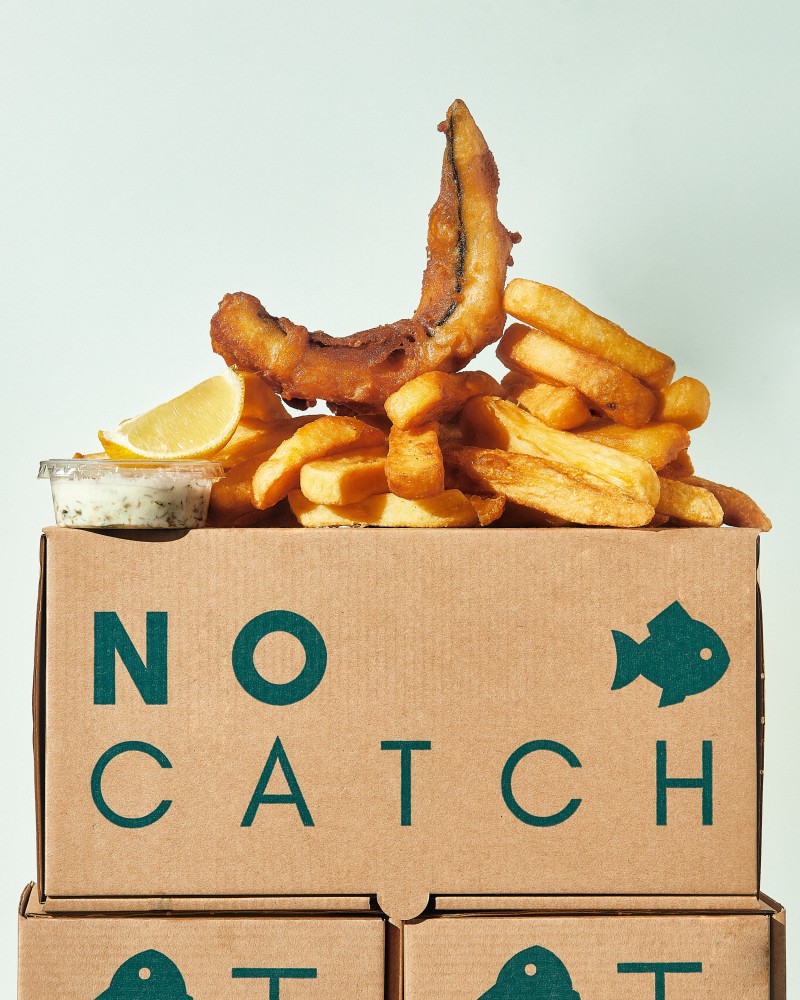A Seaside Bag of (vegan) Fish & Chips!

The No Catch Co (Brighton)
Nothing captures the essence of the English seaside, than a bag of fish and chips. It’s comfort food with a crispy golden batter. But today many people are concerned with everything from high-fat foods and palm oil (used in most shop-bought chips) to over-fishing and by-catch.
Just because something is traditional, does not mean we have to bin it. We can just ‘update things’ with something better and tastier! This also helps to keep the traditional English chippy thriving, in a sea of fast food chains.
Avoid feeding chips to young children and people with swallowing difficulties, due to choking hazards.
Also don’t give leftovers to pets or wildfowl/birds, due to salt and fat (which can smear on feathers, affecting waterproofing and insulation). Read more on food safety for people and pets.
The Evolution of Fish and Chips in England
A classic in food history in England, the meal of fish and chips began (just like the McDonald’s Filet-o-fish) as something to make ‘for Catholics’, who never ate meat on a Friday.
If you are old enough, you likely have memories of many families queuing up at the local chippy at the beginning of the weekend, for their fast food supper, which often came wrapped in newspaper.
Chips are no longer wrapped in newspaper, due to food regulations. Also it’s not really good to buy ‘fish leftovers for cats’, as most have hidden bones, and are too fatty.
Vegan Fish: Ingredients and Techniques
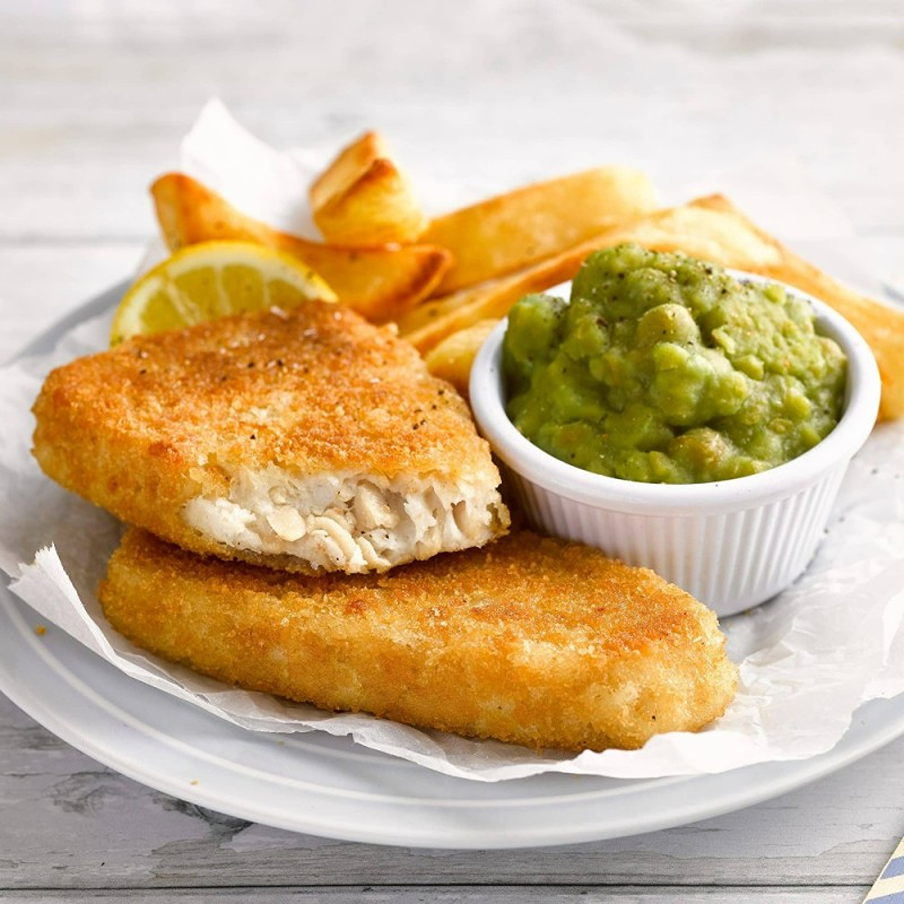
Plant-based ‘fish’ may sound strange, but in fact it’s a pretty good idea. The main fish of cod is actually now an endangered species, due to being so popular. So much so, that environmentalists warn people to beware, as some chip shops now sell ‘dogfish’ which is actually shark.
The alternatives are widespread. Some foodie chip shops sell ‘banana blossom’ (an acquired taste for some), the most popular is the commercially-sold Moving Mountains Fishless Fillets (cheap to buy, and tastes just like real fish). Made with real ingredients too!
Homemade Seaside Chip Recipes
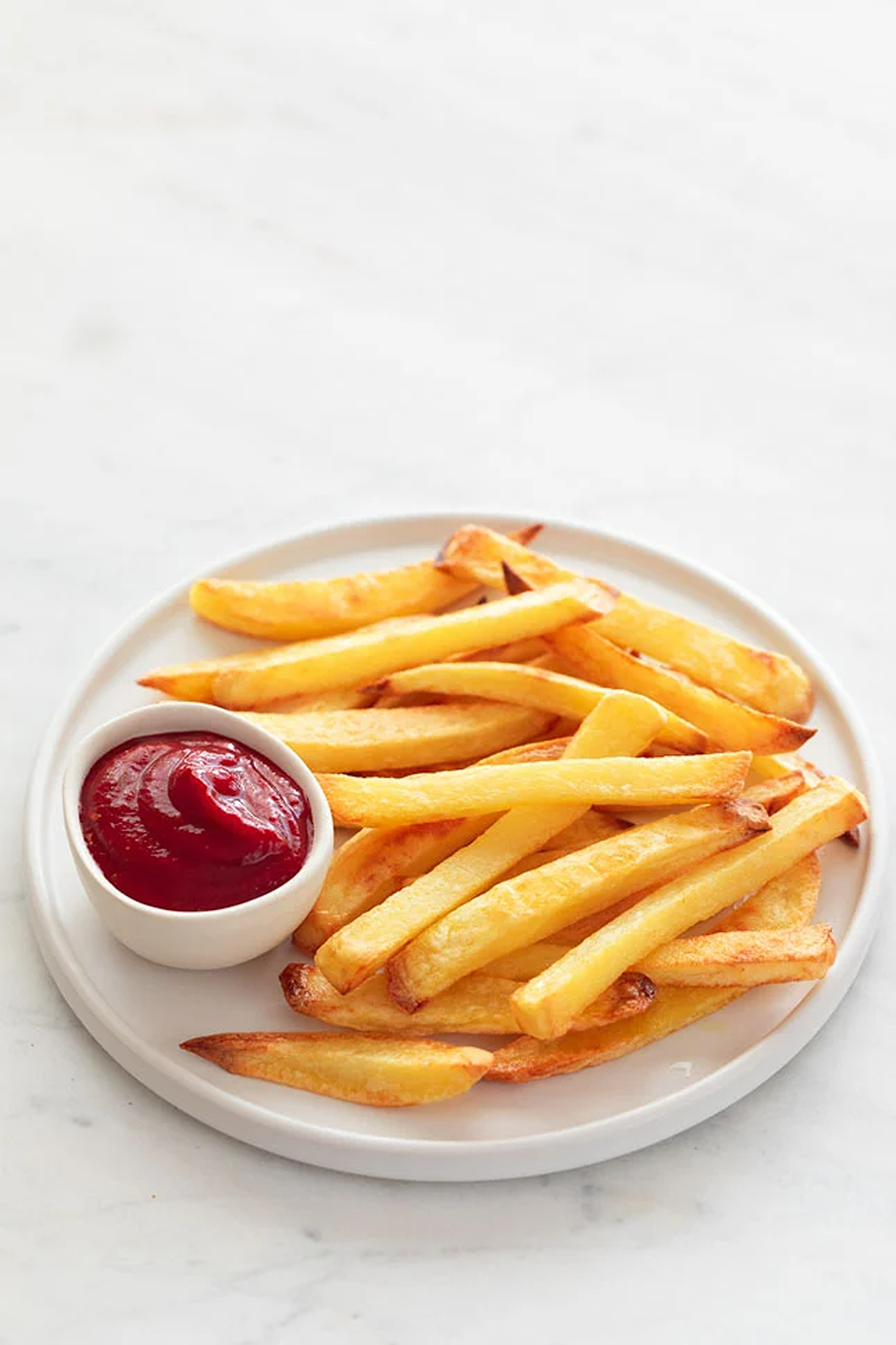
If you fancy making your own homemade chips, it’s pretty simple. Throw out the deep-fat fryer (your local fire service will thank you, as fat-fryers are the number one cause of kitchen fires in England).
Instead, try this 3-ingredient recipe for baked French fries (Simple Vegan Blog). Just Russet potatoes, and a little salt and olive oil.
Chop Maris-Piper or King Edwards spuds to bake in the oven, or invest in an air-fryer (this needs little or no oil to make ‘fried-tasting’ chips, and you can also use them to cook most frozen ready-meals, to save energy bills over baking in the oven.
Most people like to sprinkle some salt on their chips, so go for natural sea salt brands, which are sustainably-harvested (and give a little iodine, unlike cakey table salt).
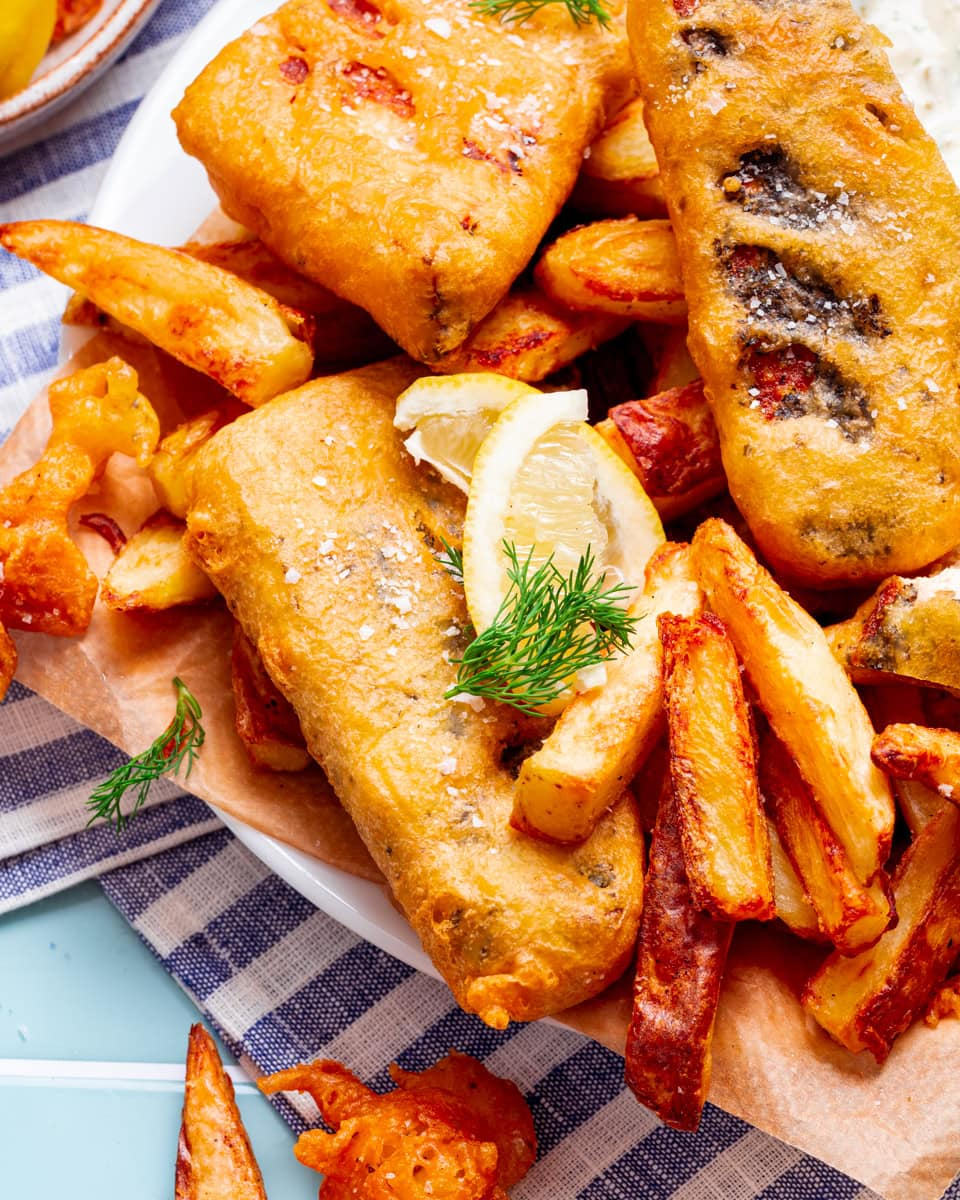
This recipe for Crispy Beer-Battered Vegan Fish & Chips (School Night Vegan) is by a foodie blogger from Hastings, home of some of the best chip shops in England. So he knows how to recreate the recipes!

This beer-battered tofish and chips recipe (Cupful of Kale) is another recipe that uses tofu to recreate the popular dish. We like Tofoo (organic, and made in Yorkshire!)
Where to Buy Good Frozen Chips
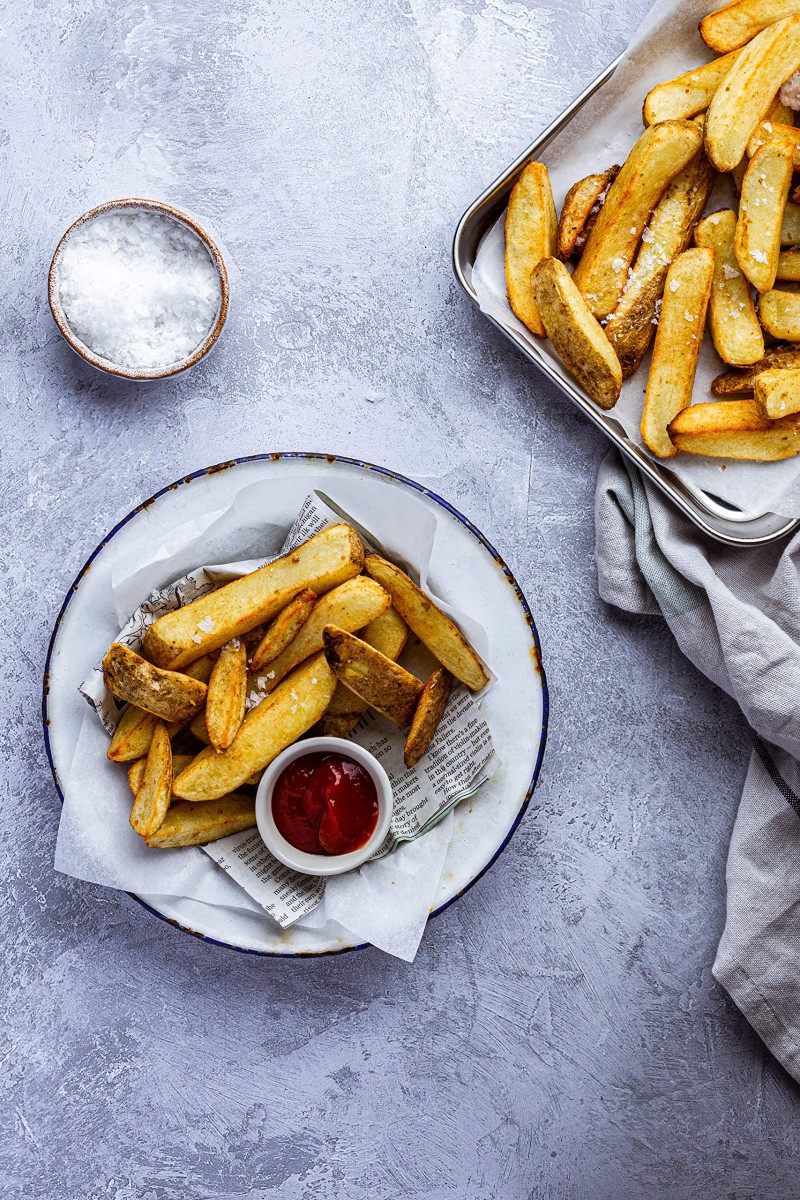
We think the best brand is Strong Roots Proper Chips, sold in most supermarkets. Made with potatoes and sunflower oil, there are also skinny chips, sweet potato fries, crispy crinkle fries and root vegetable fries.
Recycle packaging at supermarket bag bins (they print the carbon footprint of all packaging).
Find Good ‘Vegan Fish & Chip Shops’
Some cities (like London) offer good vegan fish and chips (the family-run Sutton & Sons is renowned for its ‘banana blossom’ options).
The No Catch Co is a unique take on the traditional fish and chip shop, in that it does not serve fish! Instead, this Brighton takeaway (you can also eat in) offers a range of unique alternatives, to serve alongside your bag of seaside chips.
It offers algae-based protein alternatives (2.3 trillion fish are killed each year for food). In an industry that also catches other creatures like dolphins, seals, whales, sea turtles and sharks – and causes immense suffering and greenhouse gas emissions.
Diners are blown away by how wonderful alternatives::
- Vegan Cod or Smoked Haddock & Chips
- Jumbo Battered Saveloy & Chips
- Jumbo Lemom Shrimp
- Calamari Sides & Chips
- No-Cow Desserts!
If you’re ordering from a traditional chippy, say no to plastic bags, as these are not just bad for the planet, but also make your chips go soggy. Chip shops can invest in plastic-free packaging from Vegware (like pots for mushy peas).
Did you know that KFC fries are cooked in the same oil as their chicken? And although their fries are vegan here, abroad McDonald’s fries are not abroad?
And although their fries are vegan, Burger King ‘plant-based whoppers’ are again cooked alongside the meat? Which rather defeats the point.
Filet-of-fish (apparently Donald Trump’s favourite meal) was created in the 50s to offer something for Catholics who didn’t eat meat on Fridays.
But today Alaskan pollock is so over-fished that one sustainability expert writes that ‘if you’re eating fish but you don’t know what kind it is, it’s almost certainly pollock’.
The History of the English Chippy
England’s first chip shops arrived in the 1800s. People were already eating fried fish in London, and cooked chips in northern England. Soon the two were combined.
Today most chip shops offer ‘vegan options’, but nearly all use the main brand of oil, that is made with palm oil. Greenpeace says there is no such thing as ‘sustainable palm oil’, this is just a self-policed term by industry, and the oil is used because it’s cheap and long-lasting.
It would be far better to support local farmers and use locally-sourced rapeseed or sunflower oil. It may not last as long, but then it’s not flown half-way around the world either, nor do such oils impact the habitats of orangutans and other endangered creatures.
We have the power as consumers to demand change. If people simply did not buy chips from shops that used palm oil, they would soon switch over.

